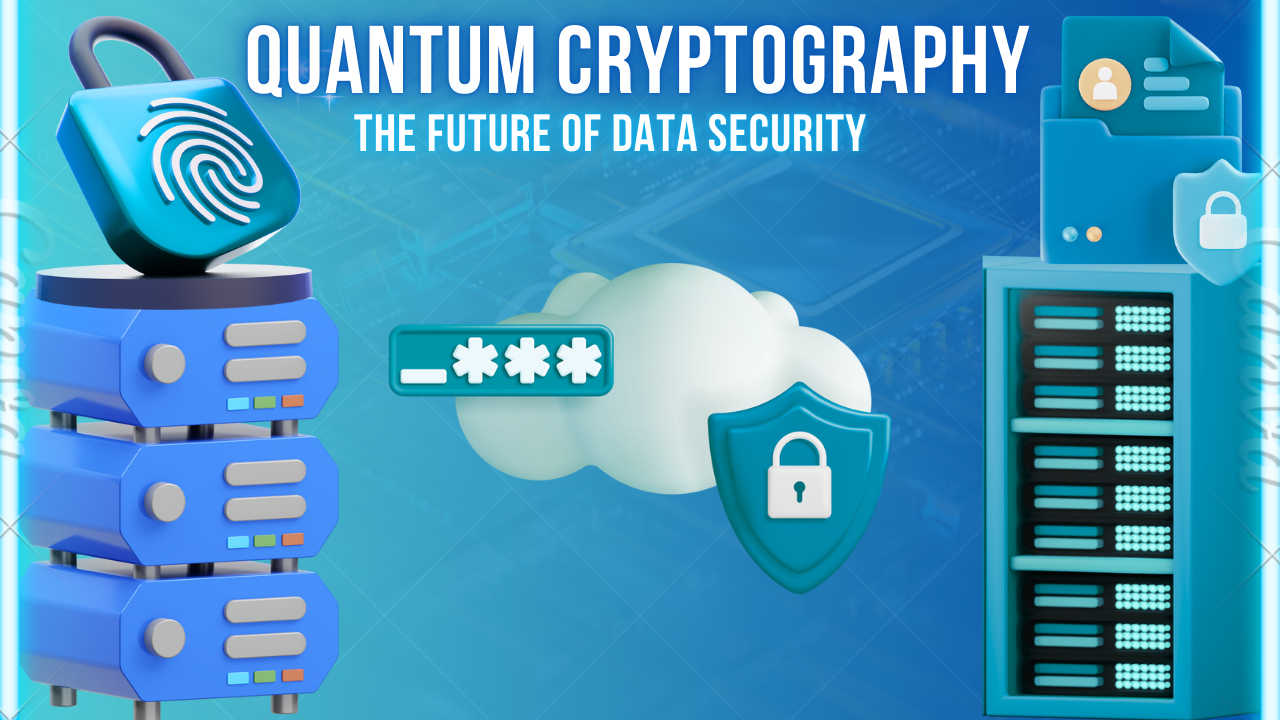Imagine a world where data breaches and hacking are a thing of the past. Quantum cryptography promises this future, a revolutionary technology set to transform digital communication security. With 85% of global enterprises experiencing breaches in the last year, the urgency for unbreakable encryption is at an all-time high.
Quantum cryptography uses quantum mechanics to provide unmatched data protection, marking it as the pinnacle of cybersecurity. It leverages photons and quantum physics laws, offering security far beyond traditional methods.

Key Takeaways
- Quantum cryptography offers unparalleled levels of data protection by harnessing the principles of quantum mechanics.
- With 85% of global enterprises reporting at least one data breach in the past year, the need for unbreakable encryption has never been more pressing.
- Quantum cryptography leverages the inherent properties of photons and the laws of quantum physics to create an unbreakable encryption system.
- This revolutionary technology is poised to revolutionize the way we secure our digital communications, making data breaches and hacking a thing of the past.
- Quantum cryptography represents the future of data security, offering a level of protection that traditional methods cannot match.
What is Quantum Cryptography?
Quantum cryptography, also known as quantum key distribution (QKD), is a groundbreaking method for secure data transmission. It uses the unique properties of quantum particles. This technology relies on quantum mechanics, where observing a quantum system changes its state. This ensures that any attempt to intercept data is immediately detected, making it highly secure.
Understanding the Principles of Quantum Mechanics
Quantum cryptography is based on quantum mechanics. Quantum particles, like photons, can exist in multiple states at once. This is known as superposition. It allows quantum cryptography to detect unauthorized access. If someone tries to intercept the transmission, the act of observation will collapse the quantum state, alerting the legitimate parties.
The Importance of Secure Communication
In today’s world, secure communication is more critical than ever. Traditional cryptography methods are vulnerable to new threats and advancements in computing. Quantum cryptography, however, offers unparalleled security. It uses quantum mechanics to protect sensitive data from unauthorized access. This technology is set to transform how we secure our data security and enable secure communication across industries.

“Quantum cryptography is the future of data security, harnessing the principles of quantum mechanics to safeguard our most sensitive information.”
How Quantum Cryptography Works
At the core of quantum cryptography is the creation and sharing of a secret key between two parties. This key is essential for encrypting and decrypting data, ensuring its privacy. The method involves sending single photons, which carry the key information. If someone tries to intercept these photons, it will change their state, signaling the presence of an eavesdropper.
The key principles behind quantum cryptography’s secure data transmission are:
- Quantum Mechanics: Quantum cryptography leverages quantum mechanics’ unique aspects, like the uncertainty principle and the no-cloning theorem, to safeguard data.
- Photon-based Key Exchange: Parties exchange single photons, each with a bit of the secret key. This key is then used to encrypt and decrypt data.
- Eavesdropper Detection: Any attempt to intercept or measure photons during key exchange will alter their state, alerting parties to an eavesdropper.
Quantum mechanics’ unique properties, combined with single-photon transmission, form the basis of quantum cryptography. This enables secure communication and data transmission, protected from quantum cryptography attacks.
| Key Steps in Quantum Cryptography | Description |
|---|---|
| 1. Quantum Key Distribution | The communicating parties generate and exchange a shared secret key using a quantum channel. |
| 2. Encryption and Decryption | The shared key is then used to encrypt and decrypt the data being transmitted, ensuring its confidentiality. |
| 3. Eavesdropper Detection | Any attempt to intercept the quantum key exchange is detected due to the inherent properties of quantum mechanics. |
This quantum cryptography process ensures secure communication and data transmission between parties. It’s a vital technology for safeguarding sensitive information in today’s digital world.

Quantum Cryptography vs. Classical Cryptography
The digital world’s rapid growth underscores the critical need for secure data transmission. Classical cryptography, once the gold standard, is now facing a challenger in quantum cryptography. This new method leverages quantum mechanics to protect data, unlike traditional algorithms.
Advantages of Quantum Cryptography
Quantum cryptography stands out with several key benefits over classical methods:
- Unbreakable Encryption: Quantum cryptography’s use of photons to encode information makes it virtually unbreakable. Even the most advanced quantum computers find it impossible to intercept or alter the data.
- Immediate Detection of Eavesdropping: Quantum systems can instantly spot any attempts to eavesdrop. This ensures the data remains secure and private.
- Future-Proof Security: Unlike classical cryptography, which may fall prey to quantum computers, quantum cryptography is inherently safe. It offers a lasting solution for data protection.
| Feature | Quantum Cryptography | Classical Cryptography |
|---|---|---|
| Encryption Strength | Unbreakable | Vulnerable to Quantum Computer Attacks |
| Eavesdropping Detection | Immediate Detection | Difficult to Detect |
| Future Proofing | Resistant to Quantum Threats | Susceptible to Quantum Computer Attacks |
Quantum cryptography’s benefits are clear, promising to transform data security and protect sensitive information in the digital era. As technology advances, the demand for advanced security solutions grows. Quantum cryptography emerges as a leading, innovative method for data protection.

“Quantum cryptography is a game-changer in the field of cybersecurity, offering unbreakable encryption and immediate detection of eavesdropping attempts.”
Applications of Quantum Cryptography
Quantum cryptography has emerged as a revolutionary technology, offering unparalleled data security in a wide range of industries. It shines particularly in securing financial transactions, a sector where the stakes are exceptionally high.
Securing Financial Transactions
In finance, where sensitive information and high-value assets are exchanged daily, quantum cryptography is crucial. It ensures the confidentiality and integrity of stock trades, bank transfers, and other critical communications. This is thanks to its use of quantum mechanics.
Its inherent resistance to eavesdropping and tampering makes it indispensable for financial institutions. They use it to protect their clients’ assets and maintain stakeholder trust. As the financial landscape evolves, quantum cryptography’s adoption is increasing. It solidifies its role in securing data transmission.
“Quantum cryptography is a game-changer in the financial industry, providing an unparalleled level of protection for high-value transactions and sensitive data.”
Financial institutions can safeguard their operations by incorporating quantum cryptography into their security protocols. This helps mitigate cyber threats and keeps them ahead in the digital landscape. As the technology matures, its applications in finance are expected to grow exponentially.

Challenges and Limitations of Quantum Cryptography
Quantum cryptography provides unmatched security, yet it encounters several hurdles. The main challenge lies in its technical complexity and the need for specialized equipment. This makes setting up quantum cryptographic systems a daunting task.
The range and distance for distributing quantum keys are also significant limitations. Currently, key distribution is restricted, necessitating dedicated infrastructure and specific network setups. This poses logistical and financial hurdles, especially for organizations spread across different locations.
- Technical complexity and specialized equipment requirements
- Limited range and distance for quantum key distribution
- Compatibility issues with existing communication networks and infrastructure
- Higher costs compared to classical cryptographic methods
- Potential vulnerability to technological advancements and quantum computing attacks
Despite these obstacles, researchers and industry leaders are committed to improving quantum cryptography. They aim to enhance its practical use. As the field advances, we can look forward to overcoming these challenges. This will make quantum cryptography more accessible and widely used.

“The challenges of quantum cryptography are not insurmountable, but they require a concerted effort from researchers, engineers, and policymakers to overcome.”
Quantum Cryptography in Practice
The concept of quantum cryptography is promising, but its real-world application truly showcases its potential. Countries and organizations globally have successfully deployed quantum cryptography networks. These networks secure sensitive communications.
Quantum Cryptography in Action
China leads in quantum computing and cryptography, making significant strides in practical applications. In 2017, it unveiled a quantum-secured network between Beijing and Shanghai, over 2,000 kilometers apart. This achievement demonstrated quantum cryptography’s ability to secure data over long distances, opening doors for wider use.
The United States is also exploring quantum cryptography’s potential. The National Security Agency (NSA) is researching quantum-resistant algorithms. This is in preparation for when quantum computers threaten traditional encryption.
| Country | Quantum Cryptography Initiative | Year |
|---|---|---|
| China | Quantum-secured communications network connecting Beijing and Shanghai | 2017 |
| United States | NSA research and testing of quantum-resistant cryptographic algorithms | Ongoing |
| Switzerland | Quantum-encrypted data transmission between two banks in Geneva | 2018 |
| Japan | Deployment of quantum cryptography network in Tokyo metropolitan area | 2020 |
These implementations of quantum cryptography highlight its role in enhancing secure communication. It’s used in financial transactions and protecting critical infrastructure. As quantum cryptography advances, we’ll see more widespread use and innovative applications.
“The deployment of quantum cryptography networks marks a significant milestone in the journey towards a more secure digital future. These real-world applications showcase the practical viability of this transformative technology.”
The Future of Quantum Cryptography
As technology advances, the future of quantum cryptography is bright. Researchers and developers are pushing to improve quantum key distribution’s range and efficiency. They aim to create more compact and affordable hardware. These efforts will make quantum cryptography a common solution for secure communication, safeguarding sensitive data security across various industries.
The focus is now on building practical, large-scale quantum networks. These networks will enable secure information exchange over long distances. This will pave the way for quantum cryptography in financial transactions, government communications, and critical infrastructure protection.
Further miniaturization and integration of quantum cryptography components are expected. This will reduce costs and make the technology more accessible. Soon, quantum cryptography could be integrated into everyday devices like smartphones and IoT devices. This will significantly enhance our digital lives’ data security.
As we move forward, collaboration between researchers, industry leaders, and policymakers will be crucial. Together, they will tackle the remaining challenges and unlock quantum cryptography‘s full potential. The data security benefits of quantum cryptography will redefine how we communicate and protect sensitive information in the future.
| Advancement | Impact on Quantum Cryptography |
|---|---|
| Improved Quantum Key Distribution Range | Enables secure communication over longer distances, expanding the applications of quantum cryptography |
| More Efficient Quantum Key Distribution | Increases the speed and reliability of secure data transmission, making quantum cryptography more practical for real-world use |
| Smaller and More Cost-Effective Hardware | Facilitates the integration of quantum cryptography into a wider range of devices and applications, driving widespread adoption |
Quantum Cryptography: Key to Secure Data Transmission
In today’s world, where data security is a top priority, quantum cryptography is a game-changer. It uses quantum mechanics to offer unmatched protection. This makes it a crucial weapon against cyber threats.
The digital age demands strong security measures. Quantum cryptography is ready to provide a solid base for secure data exchange over large networks.
The Quantum Advantage
Quantum cryptography employs quantum particles’ unique properties like entanglement and superposition. This creates a secure communication channel. Any attempt to intercept or alter the data is instantly detected, making unauthorized access nearly impossible.
| Feature | Quantum Cryptography | Classical Cryptography |
|---|---|---|
| Security | Unbreakable, based on quantum principles | Susceptible to brute-force attacks and advancements in computing power |
| Key Distribution | Secure key exchange using quantum mechanics | Vulnerable to man-in-the-middle attacks |
| Scalability | Scalable to large-scale networks | Limited in scalability |
In the digital age, quantum cryptography is a beacon of hope. It secures our most critical data transmission and protects our data security against modern threats.
“Quantum cryptography is not just a theoretical concept – it is a practical solution that is already being implemented in real-world applications, revolutionizing the way we protect our digital assets.”
Conclusion
Quantum cryptography is a game-changer in data security, promising a safer digital future. It leverages quantum physics to offer unmatched protection against cyber threats. This makes it a superior choice over traditional encryption methods.
The digital age highlights the critical role of quantum cryptography. It’s set to be a key player in securing our connected world. With its unmatched capabilities, it marks a significant advancement in protecting our digital assets.
The future of data security heavily relies on quantum cryptography’s growth and adoption. As our need for secure communication increases, this technology will become even more essential. It will be a cornerstone in the fight against digital threats, ensuring our data remains safe.
FAQ
What is quantum cryptography?
Quantum cryptography, also known as quantum key distribution (QKD), is a method for securely transmitting data. It uses the unique properties of quantum particles. This technology relies on quantum mechanics, where observing a quantum system can change its state. This ensures that any attempt to intercept or eavesdrop is immediately detected, making it highly secure.
How does quantum cryptography work?
Quantum cryptography generates and distributes a shared secret key between parties. This key is used to encrypt and decrypt data, ensuring confidentiality. The process involves transmitting single photons, which carry the key information. Any attempt to intercept these photons would alter their state, alerting parties to an eavesdropper.
What are the advantages of quantum cryptography over classical cryptography?
Quantum cryptography has several advantages over classical cryptography. It uses quantum physics to ensure data security, unlike classical methods that rely on mathematical algorithms. This makes it highly resistant to attacks, including those by powerful quantum computers in the future.
Where is quantum cryptography being used in practice?
Quantum cryptography is used in various industries where data security is critical. It is particularly prevalent in the financial sector, securing high-value transactions. This ensures the confidentiality and integrity of sensitive financial communications, protecting against fraud and data breaches.
What are the challenges and limitations of quantum cryptography?
Quantum cryptography faces challenges and limitations. One major challenge is its technical complexity and the specialized equipment needed. Additionally, the range and distance for distributing quantum keys are currently limited, requiring dedicated infrastructure and specific network configurations.
What is the future of quantum cryptography?
The future of quantum cryptography looks promising. Ongoing research aims to overcome current limitations, such as improving range and efficiency. As technology advances, quantum cryptography will become a mainstream solution for secure communication, protecting sensitive data across various industries.






